Lines & Spaces
HIGH NOTES
Daisy (S6) introduces the first programme in our new Orchestra Project Dr Valerie Pearson discusses Dottyville with composer Ailie Robertson Celebrity 6 is back – and what a line-up we have! We’ve been playing with the Pianodrome over the summer … and more!
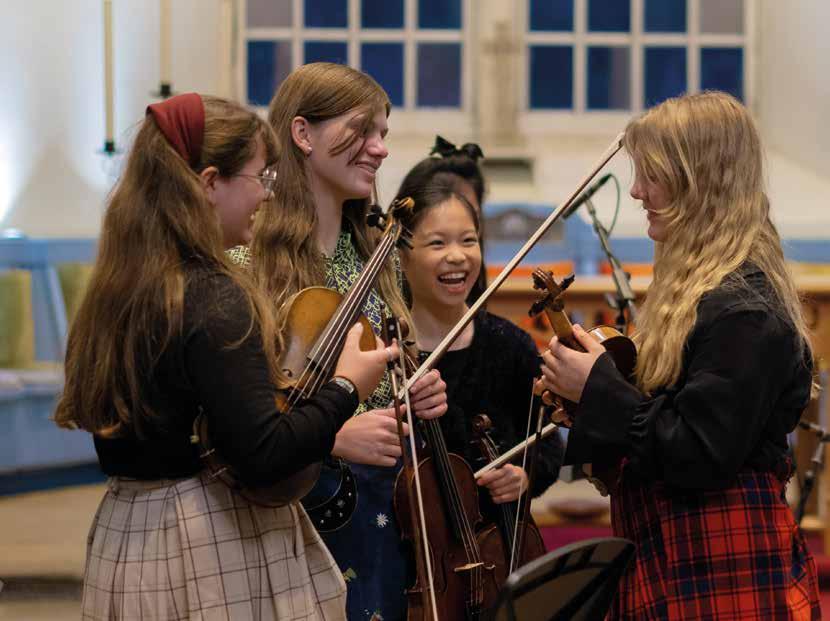 Notes from St Mary’s Music School Issue 7 Winter 2022
Notes from St Mary’s Music School Issue 7 Winter 2022
Leading from the front 2

Spotlight on… Celebrity 6 3
Two minutes with two musicians 3
A sense of timelessness on Craiglockhart Hill 4 What’s the score? 5/6
Celebrating 50 years of generosity 7
What’s on? 7
Leading from the front
This term, under the direction of John Cameron, Acting Director of Music, the School has devised and developed a number of programmes, described as ‘The Orchestra Project’. Part of the first programme, ‘Leading from the Front’ is a self-directed String Ensemble performance and Daisy (S6), first study violist, explains more.


CELEBRITY 6 IS BACK!
We’re delighted to announce that our ever popular Celebrity 6 series will return in 2023.
We have a fabulous line up of musical luminaries joining us at St Mary’s Music School and we look forward to welcoming composer and viola player, Brett Dean, on 3 February 2023; jazz musician, Julian Joseph, on 21 April 2023; and journalist and broadcaster, Kate Molleson – a former pupil of the School –on 28 April 2023.
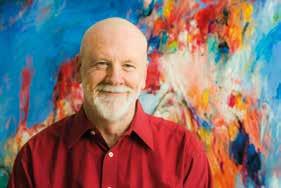
Find out more about our celebrity guests on page 3 and, if you’d like to join us on the day, please check the details on our website www.stmarysmusicschool.co.uk/celebrity6
Sign up for our e-newsletter!
Keep up to date with everything that’s happening at St Mary’s Music School, including concerts, masterclasses, open days, auditions and advisory auditions, by signing up to receive our regular e-newsletter at https://www.stmarysmusicschool.co.uk/ENews
“The idea of this project is to encourage our self-direction and to give us more independence on our musical journey. I was offered the opportunity to direct the String Ensemble from the soloist’s role, so I’ve been demonstrating different ways of playing Trauermusik by Paul Hindemith, which not only gives me a different perspective but also a unique insight into the actual music. Being ‘in charge’ allows me to share my personal interpretation of the music, choosing what ‘colours’ I want from the sound and how to both focus on and distinguish the harmonies. Obviously, there are lots of different interpretations and recordings out there, but this project has really allowed me to experiment with my own ideas and thoughts about the music. I’ve learned a lot!
Mr Cameron suggested the concept of self-direction at the beginning of term and the idea is to encourage all ensembles to address this. For example, in orchestra this term we’ve had three different coaches – Dr Kathryn Jourdan, Dr Valerie Pearson and Mr Christian Elliott – and they’ve all experimented with different seatings and different players leading the orchestra. This has really informed my leadership of the String Ensemble as I have the director role, not the teacher. I take rehearsals, and I get opinions from the rest of the players too.
I’m a viola player and violas do not usually ‘lead from the front’, so this is quite a unique experience for me. It was difficult at first to work this way – found it challenging to start off with – however, now I’m finding it easier and we have even experimented with not having the teacher present for some parts of the rehearsal, so that everything is up to me.
The same applies to choir. Mr Cameron is encouraging us all to think more in depth about what the music is about and how we are going to portray that to the audience. There are 30 of us and we have so many different ideas that we would like to show – it’s incredibly interesting to see what everyone produces!
I’ll perform the solo viola part in Trauermusik with the String Ensemble at the Christmas Concert. Following the death of King George V on 20 January 1936, Paul Hindemith had to compose the music and have it performed the very next day. In English, it translates as ‘Music for Mourning’ and we also chose it to commemorate the lives of all the people we’ve lost to Covid.
Trauermusik is a suite for viola and strings and, as a viola player in my final year at the School, it means a great deal to me to perform it and to take the solo part. The School is putting a lot of energy into recruiting viola players – we’re even having a Viola Day on 20 April – so I hope this helps to celebrate the instrument.”
Daisy is applying to conservatoires in the UK and Amsterdam and hopes to have a solo career in the future. However, she loves chamber music too and intends to stay involved in this. We wish her every success.
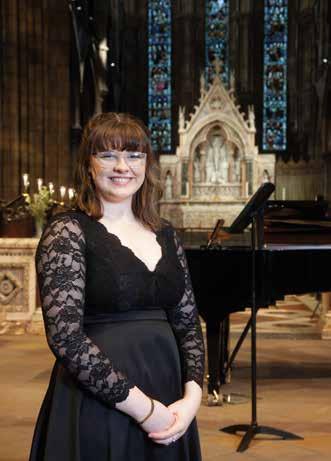
2
1
STOP PRESS!
Contents
Spotlight on… Celebrity 6
Bringing international artists to the School to share their thoughts and advice, and to work with our pupils, is a vital part of our curriculum and also the inspiration behind our Celebrity 6 series. As we look forward to a brand new series of Celebrity 6 in 2023, we’re delighted to introduce the guests we’ll be welcoming…
Brett Dean, composer and violist
3 February 2023 | Online

Brett studied in Brisbane before moving to Germany in 1984, becoming a full-time member of the Berlin Philharmonic Orchestra for over 15 years. He returned to Australia in 2000 to concentrate on compositional activities and has become one of the most internationally performed composers of his generation. His works attract considerable attention and have been championed by conductors including Sir Simon Rattle, Markus Stenz and Daniel Harding. Much of Brett’s work draws from literary, political or visual stimuli, and includes compositions inspired by his partner Heather Betts’ paintings.
Julian Joseph, jazz musician 21 April 2023 | Online
Julian has devoted his career to championing jazz music across the globe. As well as a formidable reputation as a composer and performer, he is universally recognised as a highly knowledgeable and engaging broadcaster, musical ambassador and cultural advocate. Julian’s charitable work and generosity as an educator have made a major contribution to Britain’s cultural landscape and he is much admired for his service to others and for sharing the benefits of his life in music to inspire musicians of the future.
Kate Molleson, journalist and broadcaster 28 April 2023 | Online
A former pupil of St Mary’s Music School who went on to study clarinet performance at McGill University (Montreal) and musicology at King’s College London, Kate is a highly respected music journalist and broadcaster. She teaches music journalism at Darmstadt and Dartington and presents BBC Radio 3’s New Music Show and Music Matters Her documentaries for BBC Radio 4 and BBC World Service have explored topics as varied as music in Greenland, opera in Mongolia and the lost recordings of Arabic classical music, while her articles have appeared in publications including The Guardian, The Herald, BBC Music Magazine and more.
Two minutes with two musicians
Two pupils take two minutes to talk about what they play, what they love most about being a musician, their favourite music and composers, and their musical highlights (so far!).
Carlo (S6), from Dunbar, Scotland | Organ
The organ is like an orchestra, it has a million textures and is unbelievably expressive. I stared playing when I was just two and a half. My Dad had me turning the pages every Sunday at church and when the congregation went to have tea and coffee, I’d mess about on the organ. It’s the perfect instrument to bring people together – hundreds of people singing to one instrument and never drowning it out. One of my idols is Vierne, the organist at Notre-Dame. He had an exceedingly difficult life, and had to re-learn how to play the organ twice, but was still one of the best organists in France. The highlight of any musician’s career is a good concert that lets others hear you play well. For me, that was the DRP final this year. In the future I would love to be an organist at a cathedral, as well as performing in concerts. I have an idea of being able to bring people together to hear wonderful works that you just don’t normally hear. We do this now, for instance with Baroque pieces, relearning old music that has been forgotten. To be able to go places and play music that people would not normally hear is my dream.
Jake (S2), from Gullane, Scotland | Chorister
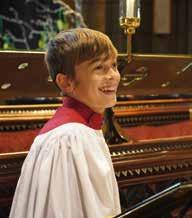
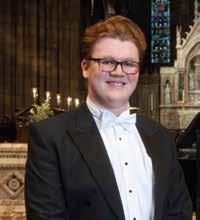
Singing with friends who have a similar interest in music is such a good feeling – working together to create something special. It can be hard work, we only get Saturdays off, but knowing we’re part of something bigger – a tradition that goes back hundreds of years – is pretty cool and something to be proud of. I love the challenge of learning new, complicated pieces of music. I particularly enjoyed Bach’s St John Passion, which is about two hours long, and I loved singing Allegri’s Miserere We get to learn and sing beautiful choral music written by some of the greatest composers of all time, which is brilliant. I’ve really enjoyed singing pieces by John Rutter and Bob Chilcott, but I’m going to go with the Scottish composer Sir James MacMillan CBE as my favourite. His music is so exciting and I love the Celtic influences like the Scottish snap rhythms. Singing my first Midnight Mass and then, two years later, opening Midnight Mass with the Once in Royal David’s City solo were both really memorable but, without a doubt, the pinnacle was entering the BBC Songs of Praise Young Chorister of the Year 2021 Competition… and making it all the way to the final! Meeting all the lovely people involved in the programme was such a privilege – it was an all-round amazing experience.
A SENSE OF TIMELESSNESS ON CRAIGLOCKHART HILL
Dottyville, by composer Ailie Robertson, is the fifth instalment of our Seven Hills Project. Its first performance took place at Edinburgh’s Canongate Kirk on 26 October, as part of ‘Landscapes and Dances: Songs She Scored Out’ in the ‘Keep It Lit’ Scottish International Storytelling Festival. Dr Valerie Pearson, Head of Strings, spoke to Ailie to find out more.
The title Dottyville comes from Siegfried Sassoon’s nickname for Craiglockhart War Hospital where he stayed as a WW1 veteran. Is the hospital the main inspiration for your piece?
It’s mostly the war element but also what I discovered about Craiglockhart Hill. There’s evidence of a fort there, suggesting people settled on the hill for a long time, so there’s a sense of timelessness in the piece. And there’s a folk influence which resonates with thoughts of the past and that’s maybe the strongest element influencing the piece. There isn’t much information about the hill’s past other than the fort, which is no longer there, so unlike some of the other hills its more recent history has eclipsed its longer history.
You knew you would be writing for GAIA Duo –violinist Katrina Lee and cellist Alice Allen. How did this affect the compositional process?

I know Katrina and Alice and their playing very well. I was conscious of their close interplay when performing together so I wanted to have them playing lines that wrapped tightly around each other, creating a richness beyond the lines. Alice shares my background in folk music and I know that things like grooves and motion are very important to her. The piece alternates between stillness and music with a strong sense of pulse. So yes, I think knowing the personalities of the players did affect my writing.
Does Dottyville represent your compositional style or do something completely different?
I think it’s quite representative of my voice. It has elements of folk music, minimalism and chromaticism, and those are all quite typical of my style. I tend to write in a very instinctive way that is quite programmatic. I always want to evoke an emotional response, so I’m driven by the emotion of the piece and in finding musical hooks. Perhaps growing up with mostly folk music and traditional classical music means that melody is still the most important thing to me.
Moving on to ‘Landscapes and Dances: Songs She Scored Out’, how important was it that all of the music was by female composers?
While I hope in the future we won’t need to think so hard about gender bias in our programmes, I think doing so at this present point in time represents a very positive shift. The fact that we don’t comment on the many all-male programmes, but do so about all-female programmes, shows there’s still an issue and it’s still something we have to think about.
Do you feel that there are things that you want to say to young composers and are there things you need to say to female composers specifically?
I think the most important thing is letting them realise it’s a career option and something they could do. It’s a growing field. Often self-confidence, especially with teenage girls, can be quite low. It’s quite daunting to put your music out there in the world, but the more you write, the better you become at it. So, ultimately, my advice would be to get writing! You need to put your music out there in order to hear it being performed – only then can you make any judgements about it.
What role models did you have growing up, or possibly later? One important figure was, and still is, the composer Sally Beamish. I was lucky enough to attend a course that Sally was mentoring on when I was in my twenties, which is relatively late as these things go. She was a great inspiration to me at that point. I find it inspiring to think how long she has been composing and how encouraging she is to others in a world that can be hugely competitive.
If you would like to watch the performance video, please visit www.stmarysmusicschoo.co.uk/Dottyville
Please help us to take new music and opportunities for music-making to as many young people in Scotland as possible through The Seven Hills Project. Visit https://www.stmarysmusicschool.co.uk/sevenhills to make an online donation. Thank you!
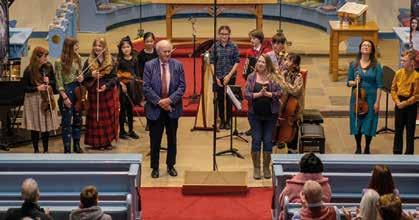
3
“It’s quite daunting to put your music out there in the world, but the more you write, the better you become at it.”
4
What’s the score?
Congratulations John!
I am who I am
Katie Foster – a former pupil of the School – joined us on 12 October with Kabantu, an award-winning quartet from Manchester, to work with our pupils. Kabantu compose and perform original folk fusion music, inspired by global sounds and cross-genre virtuosity. Their name stems from the South African philosophy of ‘Ubuntu’ –meaning ‘I am who I am because of who we all are’ –and reflects the quartet’s ethos of autonomous music-making. As Kabantu were busy touring their new album Freehand this autumn, we were so pleased that they took time out to share their incredible knowledge with our pupils. What a treat!
Songs She Scored Out
On 14 June, at St Mary’s Episcopal Cathedral in Edinburgh, our four senior solo finalists –Daisy (viola), Lydia (violin), Carlo (organ) and John (saxophone) performed before a distinguished panel of adjudicators for the Directors’ Recital Prize. Susan Tomes, Maureen Morrison and Dr Jo Buckley (a Director of the School) awarded the prize.
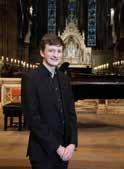
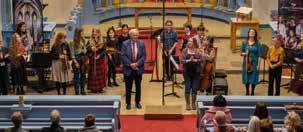
Sharing the mystery this Christmas
Composer and former pupil of St Mary’s Music School, Simon David Smith, has written the sixth instalment of our Seven Hills Project – A Shared Mystery – inspired by Corstorphine Hill and Alexander McCall Smith’s poem, Corstorphine Hill. The title of the piece is taken from the last line of the poem and Simon explores the spatialisation of sounds in resonant acoustics, inspired by his experiences of performing in both St Cuthbert’s Parish Church and St Mary’s Episcopal Cathedral in Edinburgh as a pupil here and after he left the School. An ever-changing continuum of sound is created at the centre of the ensemble by piano, organ and accordion, while horn, viola and cello are positioned at the extremes of the space, their solos signalled by the soprano saxophone. A Shared Mystery will be premiered at our Christmas Concert at St Cuthbert’s Parish Church, Lothian Road, on Monday 19 December.
Changing lives
As part of our continuing Seven Hills Project, composer Ailie Robertson wrote Dottyville, inspired by Craiglockhart Hill. Dottyville (as Ailie explains in her interview with Dr Valerie Pearson on page 4) was composed specifically for GAIA Duo – violinist Katrina Lee and cellist Alice Allen. The duo premiered the work as part of a special concert created in partnership with the Scottish International Storytelling Festival in October this year. The event, entitled ‘Landscapes and Dances: Songs She Scored Out’, presented works by female composers, including anonymised Historical Scottish Female Composers of the 1850s, whose names were often scored out. It was a common practice at the time to withhold the identity of female composers.
Our Junior Instrumentalists were also part of this concert, performing the strathspeys and reels of the Historical Scottish Female Composers which they learned in a workshop with GAIA Duo. This gave the young instrumentalists an authentic experience of how folk musicians arrange tunes as a group, without any written notes, and introduced them to the many special techniques from that practice that bring the music alive. It was an honour to have Alexander McCall Smith join us at the concert to recite his poem Craiglockhart Hill – a century ago
Earlier this year, we were thrilled with the success of our International Summer School for Piano, led by John Cameron, Head of Keyboard and Acting Director of Music. We welcomed a total of 10 pupils from the Netherlands, Ukraine, Spain, Luxembourg, Malta, England and Scotland, and received some lovely feedback.
“This could only be described as a life-changing experience for young musicians who are considering a career in such a challenging field.”

“It was an opportunity to meet like-minded people… who have become great friends since! The lessons were all incredible because you learned so much, more than I ever imagined, in such a short space of time.”
In 2023, our International Piano Summer School will take place from 6-11 August. To reserve a place or find out more, please visit www.stmarysmusicschool.co.uk/pianosummerschool
Primary round up
Our primary class has been studying History and, as part of an interdisciplinary project (combining Maths, English, History and writing skills) visited the New Lanark World Heritage site on 12 December. The pupils enjoyed dressing up and exploring the Victorian Classroom – complete with maps that are curious to see now – as well as listening to talks about child labour, the industrial revolution and factory reforms. Next term, as we prepare for our 50th Anniversary celebrations, our younger pupils are looking forward to delving into the history of School –looking at old copies of The Bugle and photographs of former pupils – it promises to be great fun!
Playing with the Pianodrome
Our friends at Pianodrome, in conjunction with Hidden Door Festival, took over the Old Royal High School building during the summer. Current and former pupils of the School all played their part, with a series of programmes performed by current pupils: Lydia (baroque violin); John (saxophone); RCS accordion trio made up of former pupils Ryan, Ciorstaidh and Sofia; and Connaught Brass, featuring former pupils Aaron (trumpet) and Robyn (French horn), on Monday 15 June. Our pupils then went on to perform a series of free lunchtime concerts (22-25 August) as part of the Summer ‘Resonancy’ programme, which included our Senior Quartet performing on the Monday and individual members playing solos to complement the quartet’s central work on the Tuesday. Wednesday saw our Junior Instrumentalists perform a selection of pieces by Beethoven, Mendelssohn, Chopin, Prokofiev and Bach, while on Thursday we enjoyed piano solos and duets from Alexander and Michelle.
In brief…
The primary class’s summer play Pinnochio was a roaring success and a good time was had by all! | In October, our biology students attended the Gene Therapy Conference at Edinburgh International Conference Centre – amazing lectures and the opportunity to participate in lots of different activities too. | Our pupils were invited to perform at the Edinburgh Open Education Conference on 8 October. Viktor, Klara, Sylvester, India, Lara, Noa, Hester and Kirsty all took part, playing music by Jospeh Haydn, Yevgeni Derbenko, Einar Englund, Martin Suckling and Piazzolla to headteachers attending from around the world.

Bigger and better than ever
Under the leadership of Philip Bartai, our new Saturday Music Classes Manager at St Mary’s Music School, we’ve expanded the range of instrumental teaching on offer to include accordion, piano and viola lessons. As free taster lessons are offered at the start of each term, anyone interested can come along and try out these instruments. We are also introducing a new string ensemble to Saturday activities. “We’d love to get every student involved in ensemble playing, to enhance their learning and discover the joy of music making with others,” Philip told us, adding, “We’ll be introducing other new ensembles this year too.” Find out more at www.stmarysmusicschool.co.uk/ music-for-all/saturday-music-classes/
House music
We’re delighted to announce that our annual House Music Competition was won by Grosvenor House in October –congratulations to all the performers! The competition was judged by John Cameron, Acting Director of Music, Kenneth Taylor, Headteacher, and Rebecca Minogue, Headteacher’s PA. As ever, it was a very enjoyable morning.
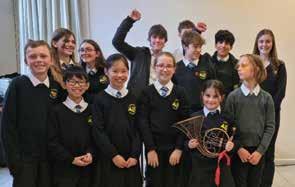
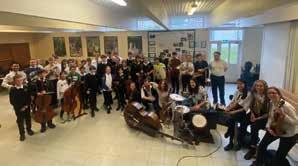
5
6
CELEBRATING 50 YEARS OF GENEROSITY
This academic year, St Mary’s Music School celebrates its 50th year as an instrumental music school – that is half a century of nurturing, inspiring, coaching and empowering musically gifted children to be the musicians, composers, conductors and teachers of tomorrow.
It is thanks to the generosity of our supporters that we have reached this remarkable milestone and that we continue to thrive and grow and look with ambition to the future. We would like to say a huge thank you to everyone who has supported us over the last 50 years and for helping the School on our journey so far. We hope that you will continue to be part of the St Mary’s Music School family and help to sustain our next 50 years of music-making.
To find out how you can play your part in the future of the School, or to discuss your support, please contact Caroline Libberton, Fundraising Manager.
Tel: 0131 538 7766, email: clibberton@st-marys-music-school.co.uk or visit: www.stmarysmusicschool.co.uk/support-us/
What’s on?
Open Days at St Mary’s Music School
Be a Chorister Afternoon 2.30-6.15pm, Friday 3 February 2023 (in person)
Open Morning 9.15-10.30am, Sunday 5 February 2023 (online)
Open Evening 7-8.15pm, Wednesday 8 February 2023 (online)
Instrumentalist Taster Day 11-3.45pm, Sunday 26 February 2023 (in person)
Masterclasses and Workshops
Oboe Workshop with Francois Leleux 18 January – details to be confirmed, please check website for more information
Viola Day incorporating the Nigel Murray Masterclass 20 April – details to be confirmed, please check website for more information
International Summer School
Piano Summer School Sunday 6 to Friday 11 August 2023
Competitions
Lord Clyde Concerto Competition
Time TBC, Friday 10 February 2023
Stockbridge Parish Church, 7b Saxe Coburg Street, Stockbridge, Edinburgh EH3 5BN
Concerts
Christmas Concert 2022 7.30pm, Monday 19 December 2022
St Cuthbert’s Parish Church, 5 Lothian Road, Edinburgh EH1 2EP
Rush Hour Chamber Music Concert 6pm, Monday 16 January 2023
St Andrew’s and St George’s West Church, 13 George Street, Edinburgh EH2 2PA
Easter Concert 2023 7.30pm, Wednesday 29 March 2023
St Mary’s Episcopal Cathedral, Palmerston Place, Edinburgh EH12 5AW
50th Anniversary Concert 7.30pm, Monday 26 June 2023
The Queen’s Hall, 85-89 Clerk Street, Edinburgh EH8 9JG
To book tickets or places, or to find out more, scan here or visit www.stmarysmusicschool.co.uk/events

instagram.com/stmarys_music youtube/stmarysmusicschoolscotland Follow us
facebook.com/stmarysmusicschool twitter.com/stmarys_music
St Mary’s Music School Trust Ltd is a charity, number SC014611. Registered in Scotland 54504. Registered office: Coates Hall, 25 Grosvenor Crescent, Edinburgh EH12 5EL
All images and text © St Mary’s Music School 2022 unless otherwise stated
Design by IL Design | Editorial by Allison Traynor & Moira Bennett
Photo credits: Nicola Dove, Fiona Duncan, Bettina Stoess, Gerry Walden, Kate Molleson, St Mary’s Music School, Dr Valerie Pearson, Moira Bennett, John Cameron
7
 Notes from St Mary’s Music School Issue 7 Winter 2022
Notes from St Mary’s Music School Issue 7 Winter 2022

















